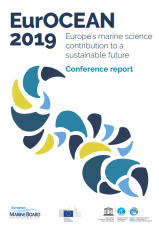
EurOCEAN 2019 took place on 11-12 June 2019 and was hosted by the Intergovernmental Oceanographic Commission of UNESCO at the UNESCO headquarters in Paris, France. The conference discussed the contribution of European marine science to the United Nations Decade of Ocean Science for Sustainable Development (2021-2030), the Ocean Decade, and is recognised as a contribution to its preparatory phase. The conference highlighted the contribution of marine science to ongoing and future initiatives supported by the European Union Framework Programmes for Research and Innovation, including Horizon 2020 (2014-2020) and the forthcoming Horizon Europe (2021-2027). The European Marine Board flagship publication Navigating the Future V (NFV) was launched at EurOCEAN 2019. Navigating the Future V describes what marine science will look like in the next decade and beyond, and what the needs are to achieve this. NFV provides robust, independent scientific advice and expert opinion with increasing importance to societal wellbeing in decades to come.
The EurOCEAN 2019 conference was co-organised by the European Marine Board (EMB), the Directorate-General for Research and Innovation from the European Commission and the Intergovernmental Oceanographic Commission of UNESCO, with special input received from the Romanian Black Sea Research Consortium and the Romanian Ministry of Research and Innovation, and additional support from the Marine Institute, L'Institut Français de Recherche pour l'Exploitation de la Mer (Ifremer), the National Oceanography Centre (NOC), Centre National de la Recherche Scientifique (CNRS), Université de Bretagne Occidentale (UBO) and the Norwegian Marine University Consortium.
The report highlights that possible solutions exist to the challenges the ocean faces. However, these need to be aligned, implemented and enforced via holistic approaches, ensuring willingness, trust and co-creation by all stakeholders. The marine science community has the vital responsibility to ensure that ocean science is involved in the discussion to deliver appropriate answers to societal questions, to raise awareness of the intrinsic links we have with the ocean, and to inform and give courage to relevant decision-makers at all levels at the appropriate time.
Europe is at the forefront in enabling science to provide support in making wise decisions and has the potential to become the largest ocean research community in the world. European marine science is prepared to contribute to handling the critical challenges we now confront.
Ocean issues now have the attention of society. The European marine science community, national governments and the European Union are engaged and need to deliver the objectives of the UN Decade of Ocean Science for Sustainable Development (2021-2030).
Everybody is responsible for making it a success. We can’t manage the ocean; we can only manage human activities.